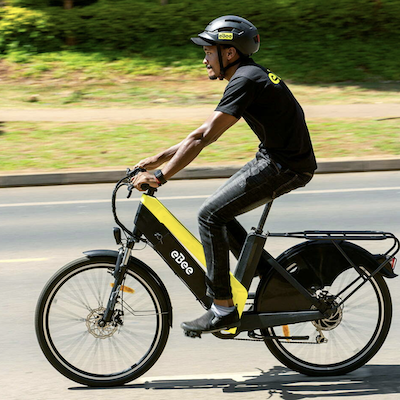Product Description
eBee is an electric bike with pedal assist designed for use in Sub Saharan Africa ana offered for the delivery market under a vehicle-as-a-service concept via a subscription basis.
Market Suggested Retail Price
$23.00
Distributors / Implementing Organizations
Jumia (e-commerce platform intended to test and distribute eBee products)
Manufacturing/Building Method
Unknown
Intellectural Property Type
Trademarked
User Provision Model
eBee offers e-bikes on a subscription basis for the delivery market, through ImaliPay. eBee retains ownership of the bikes and is responsible for its maintenance. Riders can access the bikes via daily, weekly, or monthly subscriptions.
Distributions to Date Status
The current distributions to date is unknown, although eBee Africa aims to distribute 1,000,000 e-bikes in Africa by 2030.
Design Specifications
The eBee bike is designed for a maximum speed with electric assistance at 25 kph. It has a long range of 70 km per charge and takes approximately 3-4 hours to fully charge using any standard electrical socket. The bike features a low frame so that all individuals, including women, can ride them easily. It has 7 different speeds and a maximum nominal power of 250 W for the motor.
Technical Support
Local technicians (“e-mechanics”) provided by eBee.
Replacement Components
The bike is designed for compatibility with locally available spare parts. Parts are maintained and replaced by local technicians (“e-mechanics”) provided by eBee.
Lifecycle
Unknown
Manufacturer Specified Performance Parameters
eBee Africa is promoting electric bicycles as a more affordable, cleaner, and convenient option for service providers operating on heavily congested roads in Nairobi and other large cities on the continent. eBee’s e-bikes are specially designed for food and light parcel delivery. eBee’s e-bikes have been specially built for Africa.
Vetted Performance Status
Unknown
Safety
Potential hazards include traffic accidents or pedestrian crashes, especially when sufficient training has not been received. Users should follow any bicycle helmet legislations or use PPE that has the potential to mitigate injury after a crash, or use other interventions to actively promote safe cycling.
Complementary Technical Systems
None
Academic Research and References
This paper explores the advantages of e-bikes in the Kenyan community.
Okwemba, C, 2021, Kenya’s E-Commerce Turns to Electric Bikes to Cut Carbon Emission, The Star.
Compliance with regulations
eBee products are compliant with the Kenyan law, Section 2 of the Traffic Act, stating that e-bikes cannot be self-propelled, excluding “throttle” electric bicycles. The product is compliant with the European legislation that excludes the Class-2 e-bikes allowed in most US States. E-bikes are considered under the bicycle category, they have therefore to respect the same rules on the road. eBee is also compliant with rules in South Africa technical limits.
Other Information
None
Get more information about Solutions Library and its features.
Learn MoreHave thoughts on how we can improve?
Give Us Feedback